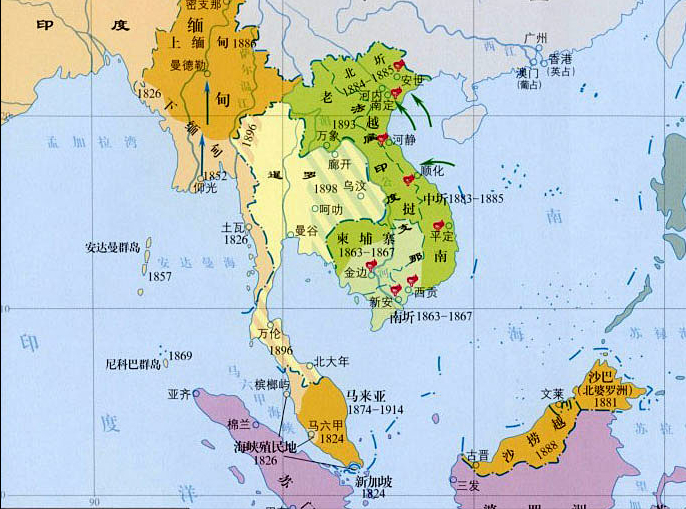Originality is not easy, stay tuned. Related video link: How did the filthy British Empire gracefully exit its Asian colonies?
Before World War I, Asia, the world's largest and most populous, was largely a Western colony. Looking around, there were only two independent countries in East Asia, China and Japan. There is also a strange thing: Thailand, at best a half-independent country, was also called Siam at the time, nominally an independent country, but in fact served as a buffer state for British Burma and French Indochina.

After the outbreak of World War II, Thailand joined the Axis camp, signed an offensive and defensive alliance with Japan, and declared war on Britain and the United States with great care, but when Japan was defeated and surrendered, Thailand immediately declared that the declaration of war was invalid. In any case, it was once the only country in Southeast Asia that did not become a Western colony, and Thais are still proud of it today. It can also be seen from this that the British and French rivals are very interesting, fighting each other in Europe, grabbing colonies overseas or fighting each other, as if Britain still has the upper hand.
In general, the impact of World War I on western Asia was relatively large, and Western Asia was roughly in line with what Europeans called the Middle East, excluding, of course, North Africa. After all, world war I crushed the Ottoman Empire, and these territories were once within the empire's territory. The three south Caucasus countries in Western Asia had been annexed by Tsarist Russia at that time, Georgia had been annexed by Russia as early as 1801, and historically, Azerbaijan and eastern Armenia had been controlled by Iran, and then Iran itself had fallen into the sphere of influence of Russia and Britain, and it could not be taken care of. Moreover, The independence of Afghanistan was also the product of many wars between Britain and Iran.
The Arab region of West Asia was basically reduced to an Anglo-French colony, but in other words, whether it was called a trust land or a mandated territory, the essence remained unchanged.
In the more than a decade after World War I, Turkey, Iran, Saudi Arabia, Iraq and other countries have established their own countries, and after World War II, other Arab countries have also become independent.
Today's five Central Asian countries were also in the territory of Tsarist Russia at that time, after World War I, taking advantage of the collapse of the Russian Empire, Central Asia 5 Stan also gained independence, but this is temporary, waiting for the Soviet Union to ease up, in 1922 the Soviet Union was established, and then more than a decade later, these countries have joined the Soviet Union as a republic.
Looking at Southeast Asia, the South Asian subcontinent was mainly British India at that time, Southeast Asia was colonized by Britain, France, the United States and the Netherlands and other powers, through the Spanish-American war more than a decade ago, the United States snatched from Spain to the Philippines, began nearly half a century of colonial rule; Burma, Malaysia are in the hands of the British, France controls the Indochina Peninsula, that is, today's Vietnam, Laos and Cambodian three countries; the Netherlands rules today's Indonesia, the then Dutch East Indies.
Seeing this, I feel that the fate of these countries in Southeast Asia is really tragic enough, colonized by the Western powers for a long time, and when World War II broke out, the Japanese fought again, the Pacific War launched by Japan was of course an aggressive colonial war, but objectively it promoted the independence movement in Southeast Asia, after World War II, the Western powers that were beaten away by the Japanese still wanted to come back to continue colonization, the people of Southeast Asia did not agree, they all engaged in independence movements, and finally got rid of Western colonial rule and gained independence, no wonder Southeast Asian countries have complex feelings about Japan.
Look at how the Western powers "decently" withdrew from the Asian colonies. For the Arab region, Britain and France had privately divided their spheres of influence before the end of World War I, of course, Britain still had a larger share, and France mainly controlled the coastal areas of Lebanon and Syria. The British, who were well versed in the ways of building the princes and the colonies, were always divided, and the Arab world was fragmented, and after the First World War, a string of countries emerged, and the borders of these countries were artificially demarcated.
Not only that, but the British also played the trick of marrying a woman and a second husband, using the Jordan River as the boundary to divide the Palestinian area into two, planting a transjordan in the east and still calling Palestine in the west, and granting this place to both Jews and Arabs, laying a mine for the Arab-Israeli conflict that lasted for hundreds of years.
In India, the British did the same, and we are all familiar with the disaster caused by the partition of India and Pakistan in 1947. Later, India and Pakistan fought three more wars, and the third Indo-Pakistani War, East Pakistan was divided again, forming today's Bangladesh. The South Asian subcontinent has been repeatedly divided, and if it had not been for this, India's total population would have surpassed China to become the world's largest. It can only be said that Britain, a declining colonist, could not afford to put it down.